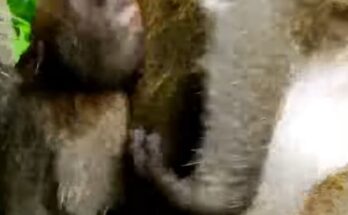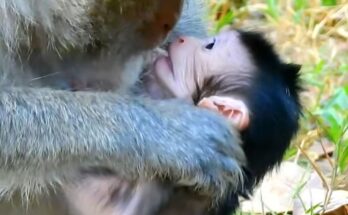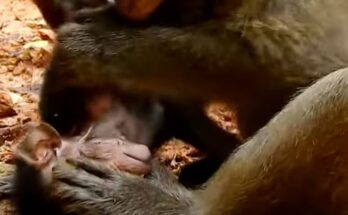Among the many species that make up the animal kingdom, primates are often regarded as fascinating due to their complex social structures and behaviors that can resemble human dynamics. However, one disturbing phenomenon occasionally observed in some primates is the cruel behavior of mother monkeys toward their offspring. Instances of mothers hitting, neglecting, or even violently discarding their young can be both shocking and perplexing. This article delves into the reasons behind such behavior, the scientific perspectives, and its implications for understanding maternal instincts in the animal world.
Observations of Cruel Behavior
Reports and studies on maternal cruelty in monkeys have revealed a range of actions that appear harmful to the young. For instance, some mother monkeys have been observed:
- Hitting their infants: Physical aggression, such as slapping or biting, is sometimes directed toward their offspring.
- Throwing their babies away: In extreme cases, mothers may physically discard their infants, causing significant harm or even death.
- Neglecting their young: A lack of nurturing, such as refusing to nurse or groom their babies, can also be a form of cruelty.
These behaviors seem counterintuitive, as maternal care is critical for the survival of many primate species. Such actions raise questions about what drives these mothers to behave this way.
Potential Causes of Maternal Cruelty
Understanding this behavior requires examining various factors, including environmental pressures, psychological stress, and evolutionary influences.
1. Stress and Resource Scarcity
One of the most common explanations is that environmental stress or resource scarcity plays a significant role. In the wild, limited access to food, water, or safe habitats can lead to increased stress in primate mothers. Under such conditions, a mother may behave aggressively or neglectfully toward her infant, possibly as a way of conserving energy for her own survival or for future reproductive opportunities.
2. Inexperience in First-Time Mothers
Young or inexperienced mothers may struggle with maternal instincts, leading to inadequate or harmful caregiving. In primate species, first-time mothers often have a steeper learning curve when it comes to nurturing their infants, and their lack of knowledge or confidence can result in rough handling or neglect.
3. Health or Developmental Issues in the Infant
Some researchers suggest that mothers may exhibit cruel behavior toward infants that they perceive as weak, sick, or unlikely to survive. This behavior could be an evolutionary adaptation to ensure that maternal resources are not “wasted” on offspring with a low likelihood of survival. While this may seem heartless, it can be viewed as a survival strategy for the species as a whole.
4. Social Dynamics and Hierarchies
In many primate societies, social hierarchies significantly influence behavior. Low-ranking mothers may experience more stress due to harassment or competition within the group, which could lead to frustration and aggression being redirected toward their offspring. Additionally, social pressures from dominant group members might indirectly influence maternal behavior.
5. Psychological Trauma
Just as humans can be affected by past trauma, primates subjected to abusive or neglectful environments may carry psychological scars that influence their parenting behavior. Monkeys raised in captivity or subjected to harsh conditions are more likely to display erratic or cruel maternal behaviors.
Case Studies in Research
Studies conducted in both the wild and captivity have provided valuable insights into these behaviors. For example:
- Japanese Macaques: Research on Japanese macaques has documented instances where stressed mothers displayed neglectful or aggressive behaviors, particularly during times of food scarcity.
- Rhesus Monkeys in Captivity: In controlled environments, rhesus monkeys have exhibited cruel maternal behavior, especially when the mother experienced social isolation or inadequate care during her own upbringing.
These observations highlight the importance of environmental and social factors in shaping maternal behavior.
Implications for Conservation and Welfare
Understanding cruel maternal behavior in monkeys has practical implications for conservation efforts, animal welfare, and even human psychology. In captivity, ensuring that primates are raised in nurturing environments with adequate resources can help reduce the likelihood of harmful maternal behaviors. In the wild, protecting habitats and reducing human-induced stressors can create conditions where primates are less likely to engage in such actions.
Ethical Considerations and Human Reactions
For humans, observing such behavior in animals can evoke strong emotional reactions, including anger, sadness, or confusion. It is essential to approach the topic with empathy and a scientific perspective, recognizing that these behaviors often stem from survival mechanisms or environmental stress rather than malice.
Conclusion
The cruel behavior of mother monkeys toward their young, while unsettling, provides an important window into the complexities of maternal instincts in the animal kingdom. Factors such as stress, resource scarcity, inexperience, and social dynamics play a significant role in shaping such behaviors. By studying these actions, scientists can gain deeper insights into the interplay between environment, behavior, and evolution, ultimately contributing to better conservation and welfare practices. Understanding these phenomena reminds us of the intricate and sometimes harsh realities of life in the animal world.


